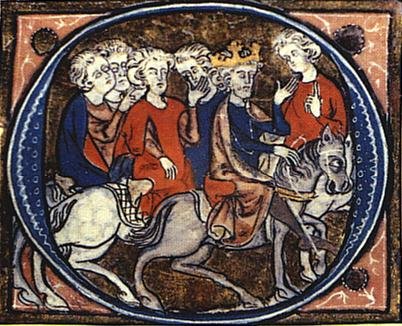
ENGL 622
Sir Thomas Malory and
and His
Literary Descendants
Dr. Jo Koster
228 Bancroft
323-4557 (o)
kosterj@winthrop.edu
http://faculty.winthrop.edu/kosterj
Office Hours:
WR
1-3 and by appointment.
Assignments
Reserve List
Grad students often ask me to recommend a good book for improving their writing style. Hunt around the used book stores for Richard Lanham's Analyzing Prose. There's a hardback edition from the 70s that you can find for around $25 used and a revised paperback from the 90s that's about $40 used. Best stylistics book I've ever taught, fwiw.
In a graduate seminar, we try to strike a balance between shorter, exploratory kinds of writing, and the longer, more polished scholarly prose that can lead to a thesis topic, conference paper, or even journal article. So this semester you'll be writing three different kinds of prose for me, which are described below. We will use the www.turnitin.com system for submitting essays.
1. Starting Point Papers. You must do five out of seven of these during the semester to pass the course (you may do more and drop the two lowest grades if you prefer). For the first two papers, I will give you a starting point, but for the rest of the papers, you must choose a quotation or critical starting point and work from it yourself. These should be between two and three double-spaced typed pages, exclusive of Works Cited page. They are intended to give you practice in developing critical stances, so they must have a point (a/k/a a thesis) to make, must support your point with specific, concrete details from the text, and must show that you have read the entire assignment, but do not need to involve extensive outside research. You need not submit a paper of any kind in the weeks when you are discussion leader but this does not excuse you from turning in the minimum of five papers. This assignment counts as 25% of your final grade (5% each), and you may not go more than 3 class meetings without submitting a paper (they can't all come in at one time, at the end of the semester, for instance). Click here for the link to the first two paper assignments.
2. Formal seminar papers. The usual "tangible product" of a graduate seminar is a formal scholarly essay that would be suitable for reading at a scholarly conference or publication in an appropriate journal. This assignment counts as 25% of your grade. Conference papers are usually cut down to nine to twelve double-spaced pages (2500-3000 words) exclusive of documentation and should take about 20 minutes to read aloud. Journal articles are usually twelve to fifteen double-spaced pages or longer. So aim for that 12-15 page range for your paper and you should be okay. Your paper must
∑ have a critical (i.e. argumentative) slant,
∑ involve close analysis of the text(s) you work with,
∑ show familiarity with the scholarly issues and discussion already published on the subject you have chosen (which will involve using the MLA bibliography, interlibrary loan, and PASCAL), and
∑ be documented according to the MLA format (unless the journal you would intend to submit to has a different format).
This assignment has three components: you must submit a descriptive abstract to me by Wednesday, October 28, at noon; turn in an annotated bibliography (at least eight items) by Wednesday, November 11, by noon; and turn in the final paper, including a revised informative abstract on or before Monday, December 7, at noon. Both the abstract and the quality (and timeliness) of your rough draft will figure into the final grade for the paper. So will the quality of your research; many good articles will be in Arthuriana, to which our databases don't subscribe, and you'll have to use ILL and PASCAL to get those resources for your paper. JSTOR is not enough!
When you turn in the final essay, you will be asked to identify a specific, appropriate journal or conference for your essay, though you need not actually submit it. You will also be asked to turn in an informative abstract for the finished paper that you could submit to a conference or journal. The Penn "Call for Papers" website is a great place to start looking for these venues.
As graduate students, I should not have to remind you that it is mandatory you avoid plagiarism, but Iíll do that anyway; consult the Guide to Using Borrowed Material on the English Department web page or ask me if you have any questions about whether youíre using source material appropriately. For tips on writing both kinds of abstract, click here. For samples of several kinds of abstracts, click here. For my Literary Analysis rubric, click here.
3. Final examination. The course will have a cumulative final examination asking you to draw together what you have learned in the course. The questions will be all essays and there will be some choice of topics. You will be given the exam questions at the final class meeting. This assignment counts as 20% of your grade. It is due at the beginning of the scheduled examination period, which is 6:30 PM on Wednesday of exam week (Dec 9).